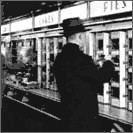DAVID ISAY: I got the call at about 4 o’clock yesterday afternoon: ”They’re closing down the Horn & Hardart tonight, on the sly. They don’t want any kind of landmark fuss. Don’t tell anyone I told you.”
I got to the Automat about a half hour later, and everything seemed normal in the huge art deco cafeteria on 42nd Street. The tables were crowded with older men and women nursing cups of coffee, reading the paper, or talking. But then: a sound from the back, where the ancient Automat machines have stood for decades.
(Drilling.)
It was true. Workmen had just begun to dismantle these stainless steel machines, cracking them apart from the wall with chisels and hammers, screwing off the marble-covered turn knobs, pulling out the tiny black-on-white signs beside each compartment: ”kaiser roll with jelly,” ”pot of baked beans,” ”bologna sandwich.” This was indeed to be the last night at the country’s last Automat. None of the customers had any idea.
You know they’re closing the Horn & Hardart tonight?
CUSTOMER: Tonight? They can’t do that, they’ve been here for over 50 years. You’re springing this on me all of the sudden. Today’s the final…? You’re not kidding.
CUSTOMER: Oh, no. We love it.
CUSTOMER: Oh, am I happy I was here to have a cup of coffee. I’ll miss it so much. I’m 97 years old. I never miss to come here. It hurts. What happened? Tell me.
CUSTOMER: Forever? Unbelievable. I came here 75 years ago. And now they’re closing?
CUSTOMER: I was brought up in the Automat. My mother brought me here. I was a hard kid to feed at home. I liked to go out to eat. No matter how good she was a cook, I liked coming to the Automat.
CUSTOMER: My mother used to take me for allergy shots. After the pain of the shots, the thing that I most looked forward to was to go up and get the chicken pot pie from the Automat.
CUSTOMER: When I was a young actress, I used to go to the Automats on Broadway. And a lot of stars would come in before show time. Before plays went on they would come into the Automat. And, oh, it was terrific! The chocolate cream pie, the pumpkin pie, and the wonderful vegetables. It was terrific, the Automat.
CUSTOMER: The Automat was the closest thing to home cooking. Really.
CUSTOMER: There were so many, I don’t know how many. How many were there? I don’t know. Everywhere they were! Everywhere! Everywhere!
CUSTOMER: Downtown, Wall Street area. Every place, yeah.
CUSTOMER: Before we’d come to work, we’d stop in, have a cup of coffee, a sandwich. It was real nice. And you always see something, some characters or something. It was beautiful.
CUSTOMER: This was years ago a poor man’s paradise. People didn’t have too much money years ago. People could come in here and ate like a rich person. They could eat, relax, enjoy, meet their people. It was nice.
CUSTOMER: You come in relax, read a paper, something you can’t do in no fast food chain now, because they got to get you in and out, and that’s the name of the game now, you know? And maybe that’s one of the things that ruined the Automat too, you know? Maybe too many people came in, stayed too long. Must be some reason why they’re closing up.
CUSTOMER: If they close this place where can we go?
CUSTOMER: Where’s a poor man gonna go? Where’s the average person gonna go?
CUSTOMER: They’ve taken a home away from people that love it so much. Makes me cry. So many years…
ISAY: At six o’clock the manager locked up the two large revolving doors at the front of the Automat, a couple of hours before usual closing time. Customers arriving for dinner pushed at the door, which budged a bit, but wouldn’t turn, shrugged their shoulders and walked away. The manager put up a small sign: ”Closed for Alterations.” Those few, who were still left sitting at the tables inside, read, chatted, and lingered over a last coffee, pouring what spilled over onto their tray back into their cups to make it last, just a little longer.
For National Public Radio, I’m David Isay.

